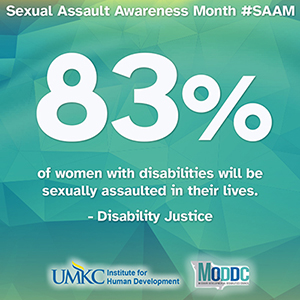Missouri's Month-Long Effort to Increase Awareness Around Sexuality and Sexual Assault
April 4, 2022

|
People with intellectual and developmental disabilities (I/DD) are disproportionately impacted by all forms of abuse, including sexual assault. According to the U.S. Justice Department, between 50 - 90 percent of people with I/DD will experience sexual violence at some point during their lives. A 2018 yearlong NPR investigation called it “the epidemic no one talks about” and reported all people with I/DD are sexually assaulted at a rate seven times higher than those without disabilities, most often by someone they know. For women with I/DD specifically, sexual assault is 12 times more likely than for women without disabilities.
In recognition of Sexual Assault Awareness Month, the University of Missouri-Kansas City’s Institute for Human Development, and the Missouri Developmental Disabilities Council (MODDC) are partners on a month-long campaign to promote self-advocacy among individuals with I/DD. The campaign efforts speak to the issues that confront people with I/DD, including how survivors of sexual assault and rape can find it difficult to form close bonds, develop healthy relationships and understand consent.
“It is so important for self-advocates to have social integration at an early age. Even in adulthood when we leave school and transition, knowing how to socialize, not isolate, is important. Isolation is when abuse happens,” said Diana Willard, self-advocate and executive committee member of the Missouri Developmental Disabilities Council.
As part of the month-long campaign, national expert and acclaimed educator in sexual health, Katherine McLaughlin, M.Ed., will host online discussions about the importance of sexual self-advocacy. The webinars will occur at 5 p.m., Central Time (CT) on Monday, April 18 and Monday, April 25. They address healthy relationships and consent.
McLaughlin is the founder of Disability Workshops, now Elevatus Training, LLC, and leads the national conversation on sexual health, advocacy and training. In Elevatus, she created an inclusive sexuality education curriculum that focuses on sexual self-advocacy.
“Self-advocacy skills are valuable because those are the skills needed to protect yourself,” IHD Research Assistant, Madeline Webster said.
Webster organizes the St. Louis area Safe Circle Coalition, which focuses on providing sexual education to individuals with I/DD. Webster also said caregivers sometimes encourage people with I/DD to be compliant because compliance can make it easier to work with them.
“But that doesn’t do anything to protect people with I/DD or keep them safe,” Webster said. “We need to teach them to be feisty. To say, ‘no, I don’t want to be touched like that.’ It is important to empower people with I/DD to say the word ‘no.’”
In tandem with McLaughlin’s webinar series, UMKC IHD and MODDC will disseminate information on social media that highlights self-advocates, relevant statistics, and resources for Sexual Assault Awareness Month. Last year, the two Missouri organizations partnered to develop the Abuse Awareness and Prevention Guide and related resources for people with disabilities, their supporters and all Missourians to be aware of and involved in the prevention and identification of abuse.
Follow UMKC IHD and MODDC to stay informed on the collaborative awareness efforts throughout Sexual Assault Awareness Month, and register for McLaughlin’s “Healthy vs. Unhealthy” session at Bit.ly/SAAMHealthy or the “Giving and Getting Consent” session at Bit.ly/SAAMConsent. More statistics and information about abuse, neglect and sexual violence among individuals with I/DD is available through the MODDC’s “It’s Happening” campaign website.







